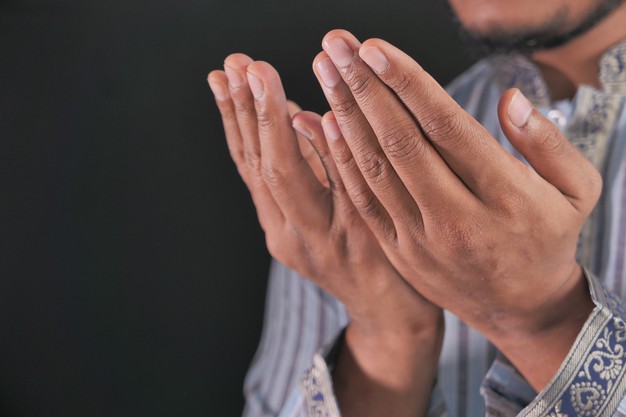7 Delicious and Practical Kastengel Recipes, Savory Lebaran Snacks that are Addictive
Among the many types of cookies, kastengel is one of the favorites. It's no wonder that kastengel recipes are sought after before Lebaran.

Kapanlagi.com - Praying five times a day is an obligation for those who believe in the teachings of Islam. After completing the prayer, do not rush to leave the prayer place. There are many benefits for you if you take a moment to sit down to remember and recite after the prayer. Moreover, the time after the prayer is one of the best times to pray.
Before praying, it is better if you start with a recitation after the prayer to praise the name of Allah so that your heart becomes calmer. Besides making the heart calmer and more peaceful, the recitation after the prayer is also a means for us to remember and get closer to Allah SWT.
READ ALSO: The Order of Dhikr After Prayer, Know the Correct Order
Allah says in the Quran:
"Remember Me, and I will remember you." (QS.Al-Baqarah: 152).
There are many recitations after prayer that you can recite as a prayer. Here are some recitations after prayer that you can read after completing the prayer, as reported by merdeka.com.

Illustration (Credit: Freepik)
The first reading after prayer is by seeking forgiveness three times and then reading a prayer.
From Tsauban radhiallahu'anhu, the Prophet Shallallahu'alaihi Wasallam said:
Usually, when the Prophet Shallallahu'alaihi Wasallam finished praying, he sought forgiveness 3 times, then read the prayer: "Allahumma antas salaam wa minkas salaam tabaarokta yaa dzal jalaali wal ikroom."
Meaning: "O Allah, You are the Peace, and peace comes only from You. Blessed are You, O Possessor of Majesty and Honor." (HR. Muslim).
In addition, you can also read a prayer that contains praise for the name of Allah SWT with the following sentences:
"Allahumma Antas-Salaamu Wamingkas-Salaamu Wa Ilaika Ya Uudus-Salaamu Fa Hayyinaa Rabbanaa Bis-Salaami Wa Adkhilna-Jannata Daaros-Salaami Tabaarokta Robbanaa Wa Ta Aalaita Ya Dzal-Jalaali Wal Ikroom."
Meaning: "O Allah, You are the one who has peace, and from You comes peace, and to You peace will return. So, O Allah, give us life with peace, and enter us into the paradise of the abode of peace. Blessed are You, O our Lord, and exalted are You, O Possessor of Majesty and Honor."
The reading after prayer is tahlil followed by reciting a prayer.
From Al Mughirah bin Syu'bah radhiallahu'anhu, he said:
I heard the Prophet Shallallahu'alaihi Wasallam after his prayer recite: "Laa ilaha illallah wahdahu laa syarika lahu, lahul mulku wa lahul hamdu wa huwa 'alaa kulli syai-in qodiir. Allahumma laa maani'a lima a'thoyta wa laa mu'thiya limaa mana'ta wa laa yanfa'u dzal jaddi minkal jaddu."
Meaning: "There is no deity worthy of worship except Allah alone, without partner. All praise and sovereignty belong to Allah. Allah is Almighty over everything. O Allah, nothing can prevent what You give and nothing can give what You prevent. Wealth and honor are of no use (to their owners). From You comes all wealth and honor". (HR. Bukhari, Muslim).

Illustration (Credit: Freepik)
The next prayer after prayer is to read a prayer as narrated by Abdullah bin Zubair radhiallahu'anhu. Usually (Abdullah) bin Zubair at the end of the prayer, when he finished the salutation, he recited:
"Laa ilaha illalloohu wahdahu laa syarika lahu. Lahul mulku wa lahul hamdu wa huwa 'alaa kulli syai-in qodiir. Laa haula wa laa quwwata illa billaah. Laa ilaha illallooh wa laa na'budu illa iyyaah. Lahun ni'matu wa lahul fadhlu wa lahuts tsanaa-ul hasanu. Laa ilaha illallooh mukhlishiina lahud diin wa lau karihal kaafiruun."
Meaning: "There is no god worthy of worship except Allah alone, without partner. All praise and sovereignty belong to Allah. Allah is Almighty over everything. There is no power or strength except with the help of Allah. There is no god worthy of worship except Allah. We worship none but Him. All blessings, favors, and good praises belong to Allah. There is no god worthy of worship except Allah, purifying our worship solely for Him, even though the disbelievers dislike it." (Narrated by Muslim).
The next reading after prayer is by reciting tasbih, tahmid, takbir, and tahlil. In reciting tasbih, tahmid, takbir, and tahlil after prayer, there are 4 authentic forms from the Prophet Muhammad Shallallahu'alaihi Wasallam, namely:
1. Tasbih 33x, tahmid 33x, takbir 33x, tahlil 1x, total 100 remembrance.
As narrated by Abu Hurairah radhiallahu'anhu, the Prophet Shallallahu'alaihi Wasallam said:
"Whoever remembers Allah after finishing prayer with the remembrance of Subhanallah wal hamdulillah wallahu akbar (33x). Laa ilaha illallah wahda, laa syarika lah. Lahul mulku wa lahul hamdu wa huwa 'ala kulli syai-in qodiir", then all his sins will be forgiven even if they are as much as the foam on the ocean." (HR.Muslim).
2. Tasbih 33x, tahmid 33x, takbir 34x, total 100 remembrance.
As narrated by Ka'ab bin Ujrah radhiallahu'anhu, from the Prophet Shallallahu'alaihi Wasallam:
"The remembrances that will not harm the person who recites them after obligatory prayers are: 33x tasbih, 33x tahmid, 34 takbir" (HR. Muslim).
3. Tasbih 25x, tahmid 25x, takbir 25x, tahlil 25x, total 100 remembrance
As narrated by Zaid bin Tsabit (may Allah be pleased with him), he said:
"They (the companions) were commanded to glorify Allah 33 times, praise Allah 33 times, and say takbir 34 times after prayer. Then a man from the Ansar had a dream and it was said to him: Did the Messenger of Allah (peace be upon him) command you to glorify Allah 33 times, praise Allah 33 times, and say takbir 34 times? He answered: Yes.
The person in the dream said: Make it all 25 times and add tahlil. When he woke up in the morning, this man from the Ansar met the Prophet (peace be upon him) and told him about his dream. The Prophet said: You should do that!" (Narrated by An-Nasa'i, authenticated by Al-Albani in Sahih An-Nasa'i).
4. Tasbih 10x, tahmid 10x, takbir 10x, total 30 remembrance
It is narrated from Abdullah bin Amr (may Allah be pleased with him), the Prophet (peace be upon him) said:
"There are 2 actions that if a Muslim servant guards, he will definitely enter Paradise. Both are easy but few practice them. The first is to glorify Allah 10 times, praise Allah 10 times, and say takbir 10 times after every prayer, which is 150 remembrance on the tongue (in 5 prayer times) but 1500 on the scale of good deeds. And the second is to say takbir 34 times before going to sleep, praise Allah 33 times, and glorify Allah 33 times, which is 100 remembrance on the tongue but 1000 on the scale of good deeds" (Narrated by Abu Daud, authenticated by Al-Albani in Sahih Abi Daud).

Illustration (Credit: Freepik)
The next recitation after prayer is to recite Ayatul Kursi. This opinion is supported by a hadith from Abu Umamah Al Bahili radhiallahu'anhu, where the Prophet Shallallahu'alaihi Wasallam said:
"Whoever recites Ayatul Kursi after every obligatory prayer, nothing can prevent him from entering Paradise except death" (HR. An Nasa-i, Ath Thabrani, authenticated by Al Albani in Shahih Al Jami').
Reciting Surah Al-Ikhlas, Al-Falaq, and An-Naas
The sixth type of remembrance after prayer is to recite Surah Al-Ikhlas, Al-Falaq, and An-Naas.
"Uqbah bin 'Amir radhiallahu'anhu, he said: The Messenger of Allah shallallahu 'alaihi wasallam commanded me to recite the mu'awwidzat (An-Naas, Al-Falaq, Al-Ikhlas) at the end of every prayer" (HR. Abu Daud, authenticated by Al Albani in Shahih Abu Daud).
The next reading after prayer is to recite a prayer as narrated by Ummu Salamah Hindun binti Abi Umayyah radhiallahu'anha, she said:
"Usually the Prophet Muhammad shallallahu 'alaihi wasallam, after performing the Fajr prayer, when he finished the salutation, he recited the prayer: Allahumma inni as-aluka 'ilman naafi'an, wa rizqon thoyyiban, wa 'amalan mutaqobbalan."
Meaning: "O Allah, I ask You for beneficial knowledge, good provision, and accepted deeds." (HR. Ibn Majah, authenticated by Al Albani in Shahih Ibn Majah).

Illustration (Credit: Freepik)
The next reading after prayer is to recite a prayer as already narrated by Mu'adh bin Jabal radhiallahu'anhu, he said:
"The Prophet Muhammad shallallahu 'alaihi wasallam held my hand and said: O Mu'adh, by Allah, I love you, indeed I love you. I advise you, O Mu'adh, never to leave after every prayer without reciting the prayer: Allahumma a'inni 'ala dzikrika wa syukrika wa husni 'ibaadatika.
Meaning: "O Allah, help me to remember You, to thank You, and to worship You in the best way." (HR. Abu Daud, authenticated by Al Albani in Shahih Abi Daud).
The next reading after prayer is to recite Surah Al-Ikhlas, Al-Falaq, and An-Nas. This recommendation comes from the following narration:
"Uqbah bin 'Amir (may Allah be pleased with him) said: The Messenger of Allah (peace be upon him) commanded me to recite the Mu'awwidzat (Surah An-Nas, Al-Falaq, Al-Ikhlas) at the end of every prayer." (Narrated by Abu Dawood, authenticated by Al-Albani in Sahih Abu Dawood).
These are some readings after prayer that you can practice as an effort to draw closer to Him and find peace in life. Indeed, Allah is All-Knowing and All-Hearing, so you are free to convey any prayer according to your desires as a reading after prayer.
(kpl/ans)
Cobain For You Page (FYP) Yang kamu suka ada di sini,
lihat isinya
Among the many types of cookies, kastengel is one of the favorites. It's no wonder that kastengel recipes are sought after before Lebaran.
These are 9 unique Eid menus that are practical and easy to serve, as luxurious alternatives to rendang and opor. What are these food menus? Let's check them out, KLovers.
Let's get straight to it, check out some easy and delicious teflon milk pie recipes with various flavors below.
In this case, as Muslims, when a phenomenon of eclipse occurs, it is recommended to perform the prayer for solar or lunar eclipse. Check out the following explanation, KLovers!
Zakat Fitrah is paid to the Amil and will be distributed to those who are eligible. Not just receiving it, it turns out there is an intention to receive zakat fitrah that can be recited by the Amil and the recipient.
These are 7 recipes for tender and easy beef stew, perfect for practical Eid menu. How and what are the ingredients? Let's check it out, KLovers.
Here are smile quotes when there's a problem, wise and make life even more peaceful.
This is an easy and delicious grilled chicken recipe for iftar menu.
All this time, wise words have never failed to be a source of inspiration, including in relationships. Wise and romantic words can be a source of inspiration and strength to strengthen relationships.
The method and recipe for lodeh vegetables are considered practical and often become the mainstay menu for housewives. This is a delicious and savory lodeh vegetable recipe.
Just go ahead, listen to the words of friends about true friends who touch the heart below.
This is 9 healthy and simple sahur menus, perfect for diet and vegetarian food. What are the foods? Let's check it out KLovers.